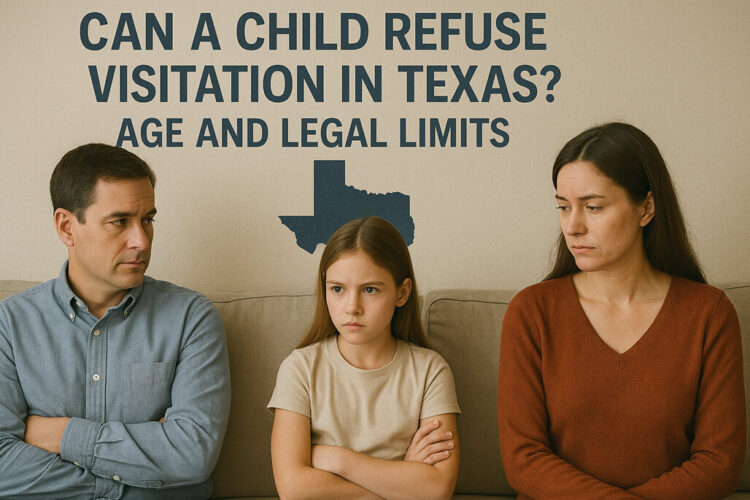When a Child Says No to Visitation: What Texas Law Says
Can a child refuse visitation in Texas? The simple answer is no. Even if a child objects to spending time with a parent, court-ordered visitation must be followed by both parents. But that doesn’t mean the situation is without options, or that the law is inflexible.
Whether your child is defiant, emotional, or genuinely distressed, this issue raises serious legal and parenting challenges. Understanding how Texas law treats a child’s preference, when a judge will listen, and what happens if you don’t comply is essential to protecting yourself and your child.
Let’s unpack the legal limits, the role of a child’s preference, and what options exist when a child refuses to go.
Can a Child Legally Refuse Visitation in Texas?
If there is a court order in place, both parents are legally obligated to follow it. That includes the custodial parent ensuring the child is available for visitation with the other parent. Even if the child strongly resists, the parent can be held in contempt of court for not complying.
Texas courts treat possession and access orders seriously. They are enforceable by law. Failing to uphold them could result in legal penalties, fines, or changes to the custody arrangement. This is true regardless of the child’s age, unless a new court order says otherwise.
That said, Texas courts understand that forcing a child into a car or a visit they strongly oppose can be emotionally damaging. Parents are not expected to drag a child kicking and screaming into visitation. They are, however, expected to make a sincere and documented effort to encourage compliance.
What Age Does a Child’s Preference Matter in Texas?
Under Texas Family Code § 153.009, children who are 12 years or older have the right to express a preference about which parent they want to live with. The court may interview the child in chambers, privately, to gather this input.
But here’s the key point. The judge is not required to follow the child’s wishes. The court will consider the child’s opinion but always puts the child’s best interests first. A preference is just one of many factors.
It also helps to clarify the distinction between expressing a preference and refusing visitation. A 13-year-old saying, “I want to live with Mom instead of Dad” during a custody modification hearing carries legal weight. But that same 13-year-old refusing to go to Dad’s for the weekend without a modified court order still isn’t legally allowed to skip the visit.
How Courts Respond to Repeated Refusal
If a child repeatedly resists or refuses visitation, courts will look closely at the full context. Judges may ask:

- Is one parent encouraging or discouraging visits?
- Is the child dealing with emotional trauma or mental health issues?
- Is the child being manipulated or alienated?
- Is there a practical issue, like distance or schedule conflicts?
In high-conflict situations, courts may appoint a therapist, guardian ad litem, or amicus attorney to investigate and recommend solutions. Reunification therapy may be ordered if there’s concern about damaged parent-child relationships.
Courts expect both parents to act in good faith. That means helping facilitate visits even when the child resists. It also means avoiding any behavior that undermines the court order. If you’re consistently trying to comply and documenting your efforts, the court is more likely to view your actions favorably.
Handling High-Conflict or Reluctant Situations
If your child is reluctant to visit the other parent, avoid framing it as “their choice.” Instead:
- Talk calmly with your child to understand their concerns.
- Document your efforts to comply with the court order.
- Avoid criticizing the other parent in front of the child.
- Consider professional counseling or therapy if emotional resistance continues.
Your tone and approach matter. Frame visitation as normal and expected. Avoid creating a tug-of-war dynamic that adds stress for your child.
Understanding Parental Alienation in Visitation Conflicts
Parental alienation occurs when one parent intentionally or subtly influences the child to reject the other parent without justification. It can show up as the child expressing fear, hatred, or complete refusal to engage with the other parent despite a previously healthy relationship.

Signs may include:
- One parent undermining the other in front of the child
- Encouraging the child to choose sides
- Interfering with communication or scheduled visits
- Rewarding the child for rejecting the other parent
Texas courts take parental alienation seriously. If the court believes that one parent is intentionally sabotaging the child’s relationship with the other, it may modify custody or enforce penalties. Documented patterns of alienation can lead to changes in visitation or even a shift in primary custody.
If you suspect alienation, consult a family law attorney immediately. They may recommend legal or therapeutic intervention to restore a balanced relationship between the child and both parents.
When a Child Has Experienced Trauma or Abuse
When a child refuses visitation due to past trauma or alleged abuse, the situation must be treated with urgency and care. Texas courts take allegations of abuse seriously and will prioritize the child’s safety.
If this situation arises:
- Notify your attorney and consider reporting to Child Protective Services.
- Document any concerning behaviors or statements made by the child.
- Seek professional evaluation or therapy to assess the child’s needs.
- Ask the court to review or temporarily suspend visitation while concerns are investigated.
Avoid assuming you must follow the current order if safety is at risk. Get legal guidance right away.
Dealing With Resistance in Blended Families
Sometimes children resist visitation due to discomfort with a parent’s new partner or stepfamily. Transitions like these can be emotionally difficult, especially if the child feels displaced or unheard.
To ease the tension:
- Introduce new family members gradually.
- Allow the child space to voice concerns.
- Consider family counseling to improve understanding and communication.
- Avoid forcing interaction between your child and your partner until the child is ready.
Judges take a child’s adjustment seriously when considering visitation modifications.
Teenagers and the “I’m Old Enough” Argument
Teenagers often assert their independence by challenging custody arrangements. They may claim they’re too old to be forced into visitation, or they may resist visits to focus on school, jobs, or social life.
Even so, court orders remain binding.
Parents should:
- Acknowledge the teen’s perspective without disregarding the court’s authority.
- Encourage consistent visitation while remaining flexible with scheduling.
- Document repeated refusals and discuss them with your attorney.
If resistance becomes a pattern, consider seeking a modification based on the teen’s expressed and consistent preference.
When to Consider Modifying the Custody Order
Sometimes a child’s resistance is part of a larger shift. If there has been a substantial change in circumstances, such as mental health concerns, abuse, or serious relational breakdown, you may be eligible to request a modification.
Texas Family Code § 156.101 allows a parent to file for custody or visitation modification based on changes that affect the child’s welfare. If the child is over 12 and expresses a strong, stable preference, this too can be a valid basis for filing.
However, filing does not mean the order will change automatically. You’ll need to present evidence that a change would be in the child’s best interest. Judges want to see that your concern is rooted in the child’s well-being. They are less likely to act if the issue stems from frustration or ongoing conflict with the other parent.
FAQs About Child Visitation Refusal in Texas
What happens if I force my child to go and they refuse?
You aren’t required to physically force them. However, you must make every reasonable effort. Document their refusal and your attempts to comply.
Can I be held in contempt if my teen won’t go?
Yes, if the court believes you didn’t do enough to comply. Courts look at intent, effort, and whether the parent acted in good faith.
Does the court always listen to a 12-year-old’s wishes?
No. The court will consider the child’s wishes, but the child’s best interest still governs the decision. The older and more mature the child, the more weight their opinion may carry.
How do I protect myself legally if my child won’t comply?
Keep records. Show that you communicated with your child, encouraged compliance, and facilitated the visit. Speak with your attorney about possible next steps or filing a modification request.
Can therapy help change the visitation outcome?
Yes. Judges often recommend or order counseling when there’s high conflict or resistance. A therapist can also help assess whether the child’s refusal is rooted in a deeper issue.
Talk to a Texas Custody Lawyer Before Taking Action
If your child is resisting visitation, don’t go it alone. You could be facing legal exposure without even realizing it. A Texas family law attorney can help you document your efforts, respond appropriately to refusal, and file for a modification if needed. Your actions now can protect your relationship with your child. They can also preserve your standing in court.

